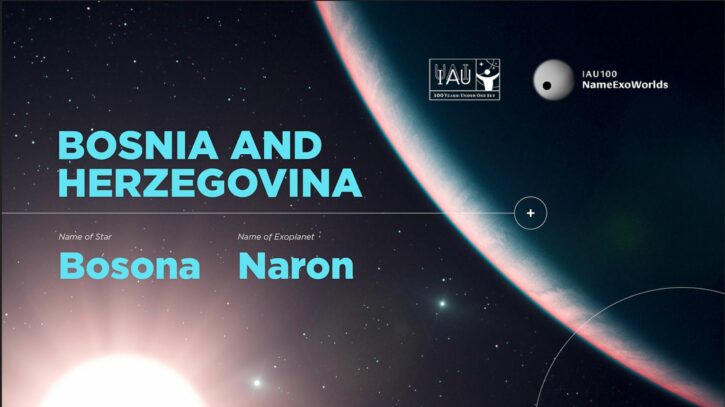
A star and an exoplanet in the Aquarius constellation were named Bosona and Naron on Tuesday, which are the 10th-century name for the territory of Bosnia and one of the earliest names of the Neretva River, in the south of the country.
A total of 112 countries organised national campaigns, within the International Astronomical Union’s 100th-anniversary commemorations (IAU100) in 2019, that stimulated the direct participation of over 780 000 people worldwide, who proposed and selected names for each exoplanet and its host star.
The names of 112 sets of exoplanets and host stars named in the IAU100 NameExoWorlds campaigns were announced on Tuesday, December 17, at a press conference in Paris.
The name Bosnia was first recorded in 10th century, in the Greek form Βόσονα (Bosona), which indicated a region. In the De Administndo Imperio manuscript (“On the Management of the Empire”), written by the Byzantine Emperor Constantine VII, he refers to Bosnia as a “small country” – Horion Bosona. The name of Bosnia is believed to have originated from a hydronym, meaning it signified the name of the river Bosna, the central watercourse in Bosnia and Herzegovina.
During antiquity, the Neretva River in the Herzegovina region (and partly in Croatia) was known as Naron, Narona and Narenta. Neretva is the largest river in the eastern part of the Adriatic basin. It was named after the Celts, and they called it “Nera Etwa” meaning “Liquid Deity.”
Bosona is the official name of HD 206610 b – a gas giant, K-type star orbited by the exoplanet Naron. Its mass is 2.036 Jupiters, it takes 1.8 years to complete one orbit of its star, and is 1.74 astronomical units from its star. Its discovery was announced in 2009.
Naron, or HD 206610 is an extrasolar planet, approximately 633 light-years away from earth.




